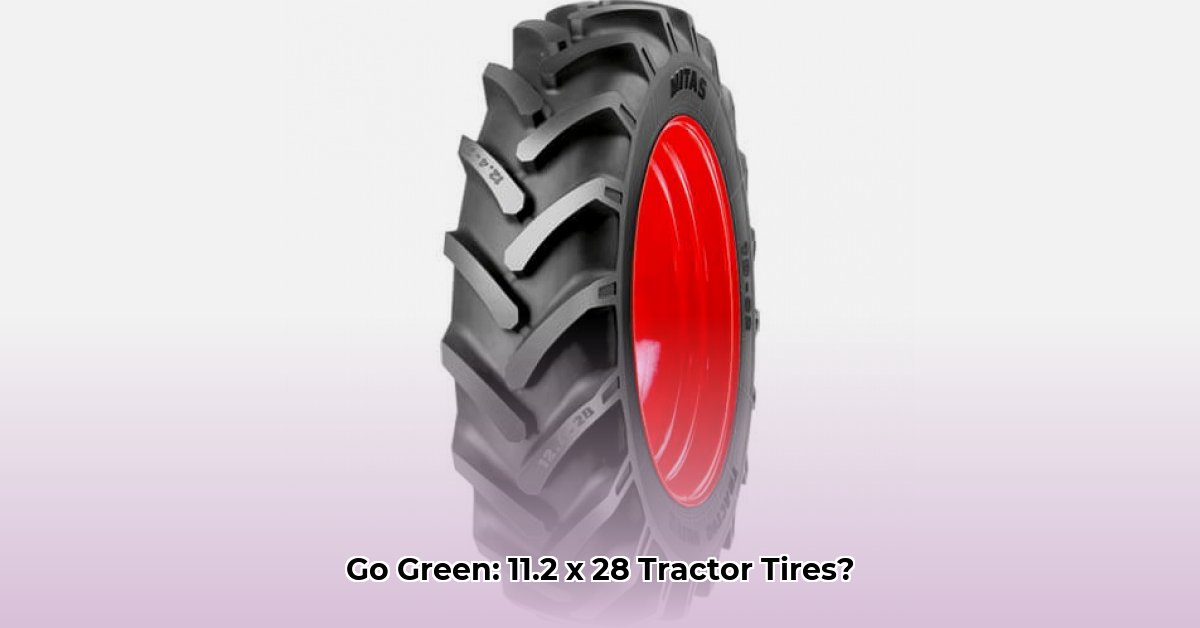
Choosing the right tractor tires is crucial for efficient and sustainable farming. This guide focuses on 11.2 x 28 tires, common in many agricultural operations. We'll cover tire specifications, selecting sustainable options, proper maintenance, and responsible disposal, all to minimize environmental impact and maximize your farm's efficiency. For more information on tire costs, see tractor tire prices.
Understanding 11.2 x 28 Tractor Tire Specifications
The "11.2 x 28" designation describes the tire's size. "11.2" represents the tire's section width in inches (the distance from sidewall to sidewall), while "28" indicates the wheel's diameter in inches. A wider tire generally covers more ground per pass, potentially increasing efficiency. However, wider tires also increase weight, potentially leading to higher fuel consumption. Finding the right balance is key. Beyond size, consider the load index (the maximum weight the tire can carry) and speed rating (maximum safe speed). Matching these specifications to your tractor and farming conditions prevents premature wear, maximizes safety, and optimizes performance.
Selecting Sustainable 11.2 x 28 Tractor Tires
Sustainable farming prioritizes environmental responsibility. When choosing tires, consider these eco-friendly options:
- Recycled Materials: Tires incorporating recycled rubber reduce reliance on virgin materials, lowering their carbon footprint. However, these might require slightly more frequent inflation checks.
- Improved Tread Designs: Tires with wider, more aggressive treads minimize soil compaction, improving soil health and potentially reducing fuel consumption. While offering superior traction in many conditions, they may reduce traction on extremely hard surfaces.
- Extended Lifespan: Tires with reinforced sidewalls and high-quality rubber compounds last longer, reducing waste from frequent replacements. Because of their durability, these tires often have a higher initial cost.
Maintaining Your 11.2 x 28 Tractor Tires for Sustainability
Proper tire maintenance is essential for both efficiency and sustainability. Neglecting this can increase fuel consumption, damage soil, and shorten tire lifespan.
Step-by-Step Maintenance:
- Regular Inflation Checks (Weekly): Use an accurate gauge to maintain the correct tire pressure as recommended by the manufacturer. Underinflation significantly increases fuel consumption and tire wear. (Proper inflation can improve fuel efficiency by up to 10%.)
- Visual Inspections (Daily): Check for cuts, punctures, embedded objects, and unusual wear patterns. Addressing small issues promptly prevents larger, more costly problems.
- Cleaning (After Each Use): Remove mud, debris, and stones that can cause damage. Clean tires enable easier inspection and better performance.
- Avoid Sharp Objects: Exercise caution in fields with rocks or other potential hazards to minimize punctures.
Consistent maintenance maximizes tire lifespan, reducing waste and saving money.
Responsible Disposal of Worn 11.2 x 28 Tractor Tires
When your tires reach the end of their life, proper disposal is critical. Avoid simply discarding them in a landfill. Explore these options:
- Tire Recycling Programs: Many municipalities or private companies offer tire recycling. These programs repurpose old tires into various products, reducing landfill waste.
- Professional Disposal Services: If recycling isn't available, contact a professional waste management company specializing in tire disposal that adheres to environmental regulations.
Conclusion
Sustainable farming demands responsible choices, and tire selection and maintenance play a significant role. By understanding tire specifications, choosing sustainable options, practicing proper maintenance, and ensuring responsible disposal, farmers can significantly reduce their environmental impact while maximizing efficiency and profitability. Even small changes in tire management can yield substantial long-term benefits for both your farm and the environment.